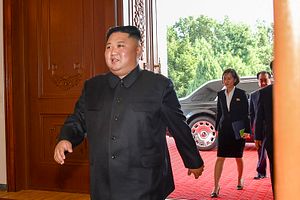On October 5, negotiators from the United States and North Korea met in Stockholm, Sweden for working-level talks. These was the first discussions to take place between the two countries since the failed second Trump-Kim Summit in Hanoi, Vietnam, in late February. U.S. President Donald J. Trump and North Korean leader Kim Jong-un had promised to resume talks at their sudden and unexpected meeting in Panmunjom in late June. Yet no significant progress has been made since the Singapore Agreement of 2018 and an air of resignation is permeating Japan over the denuclearization of North Korea.
The United States and North Korea differed in their public evaluations of the last summit. While Pyongyang concluded that the talks “broke down,” the word from Washington was that the two sides had held “good discussions.” It is impossible to know for sure because the details are still unknown. However, judging from what is currently known, it seems reasonable to assume that North Korea had intended from the beginning for the talks would fail. The tell came from North Korean chief negotiator Kim Myong-gil, who announced that the talks had broken down minutes after returning to his embassy. Under the North Korean regime, making public an evaluation of such critical discussions without the permission from Chairman Kim Jong-un is highly unlikely. It is unthinkable that Kim Myong-gil, a professional diplomat, had been authorized to make such a decision, and so we can conclude that the announcement of the breakdown in negotiations had been prepared in advance.
One could also see the breakdown of talks as a retaliation for the failed summit in Hanoi. In a policy speech in April, Kim Jong-un said, “I am neither happy about the idea of having another summit like my second one with President Trump in Hanoi, nor am I willing to have such a summit,” and acknowledged that the second summit had effectively failed.
Preoccupied with domestic issues at the time, Trump meanwhile really had no choice but to take a hard line on North Korea, and Pyongyang felt that the U.S. president had intended to leave the negotiating table from the start. We can assume that Kim, who had in fact hoped to reach an agreement, had Kim Myong-gil take a similar approach.
Kim Myong-gil said that he would “urge the United States to ponder until the end of the year,” indicating that the talks had really not broken down, and that Pyongyang was using the tactic to obtain larger concessions from Washington. North Korea hopes to achieve a relaxation of economic sanctions, the signing of a declaration ending the Korean war, and a normalization of diplomatic relations. If it is to achieve those goals, it must compromise and move toward denuclearization.
But North Korea’s stance and attitude have remained unchanged since the failed summit in Hanoi, and this is cause for concern. In April, Kim Jong-un said, “If a mutually acceptable, fair agreement is written, I will sign it without hesitation. But it depends entirely on the stance, attitude, and the methods of calculation that the United States takes.” Kim Myong-gil said, “It depends entirely on the stance and attitude of the United States whether we will spark resumed discussions by boldly acknowledging and correcting the causes of the breakdown of the talks or leave the doors of discussion shut permanently.” The North Korean side insists that it has already embarked on “denuclearization measures and measures for building trust,” such as stopping nuclear tests and intercontinental ballistic missile launch tests, scraping nuclear test sites, releasing American detainees, and returning the remains of American soldiers. It continues to demand reciprocal actions from the United States.
If North Korea continues to insist on rules for proceeding with discussions that are advantageous to itself, it may miss a major opportunity. It is highly unlikely that the next U.S. president will be as keen as Trump to “make a deal.” It is also very possible that Trump’s own patience with North Korea will soon run out.
Atsuhito Isozaki is an Associate Professor at Keio University.
































